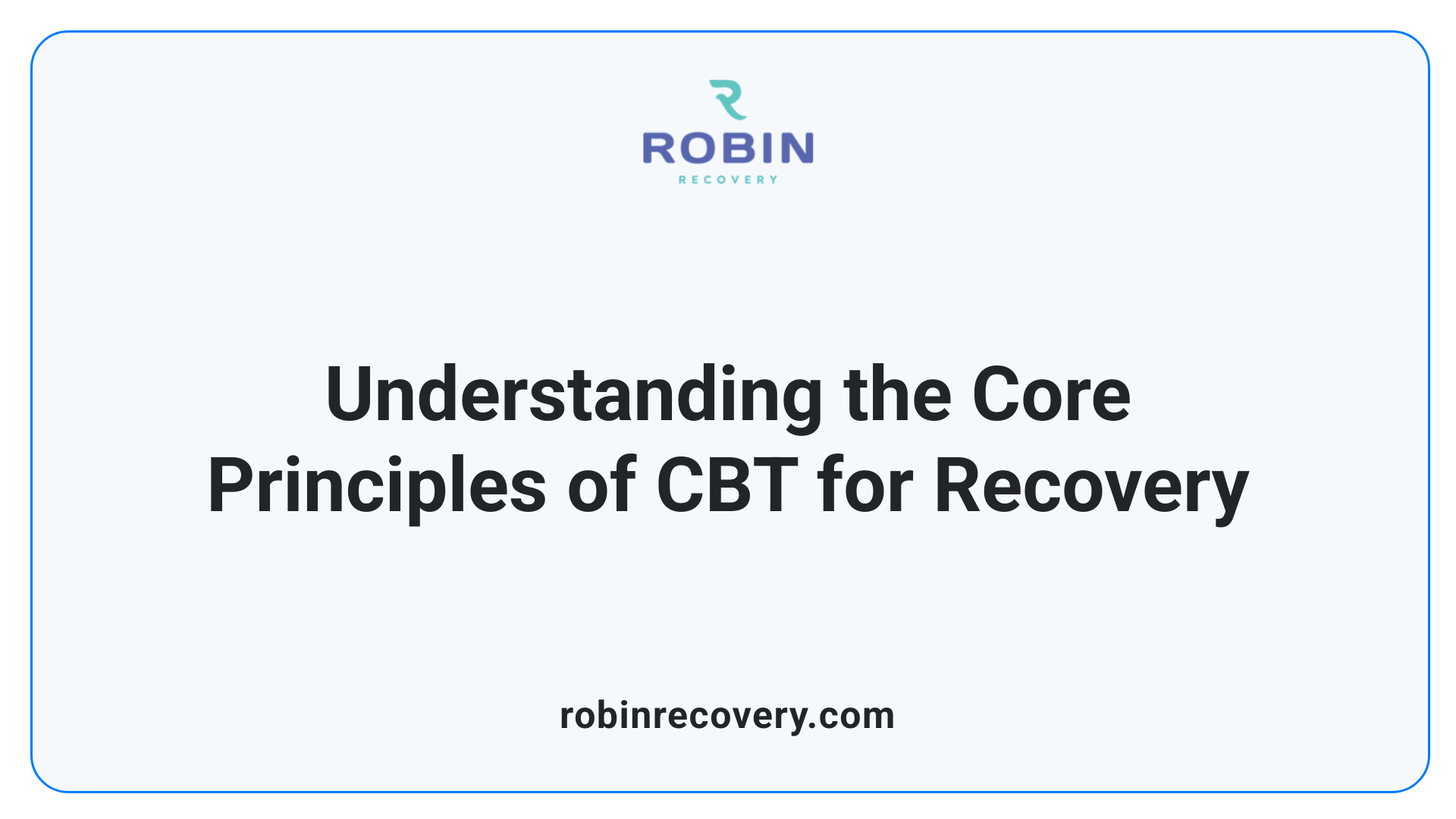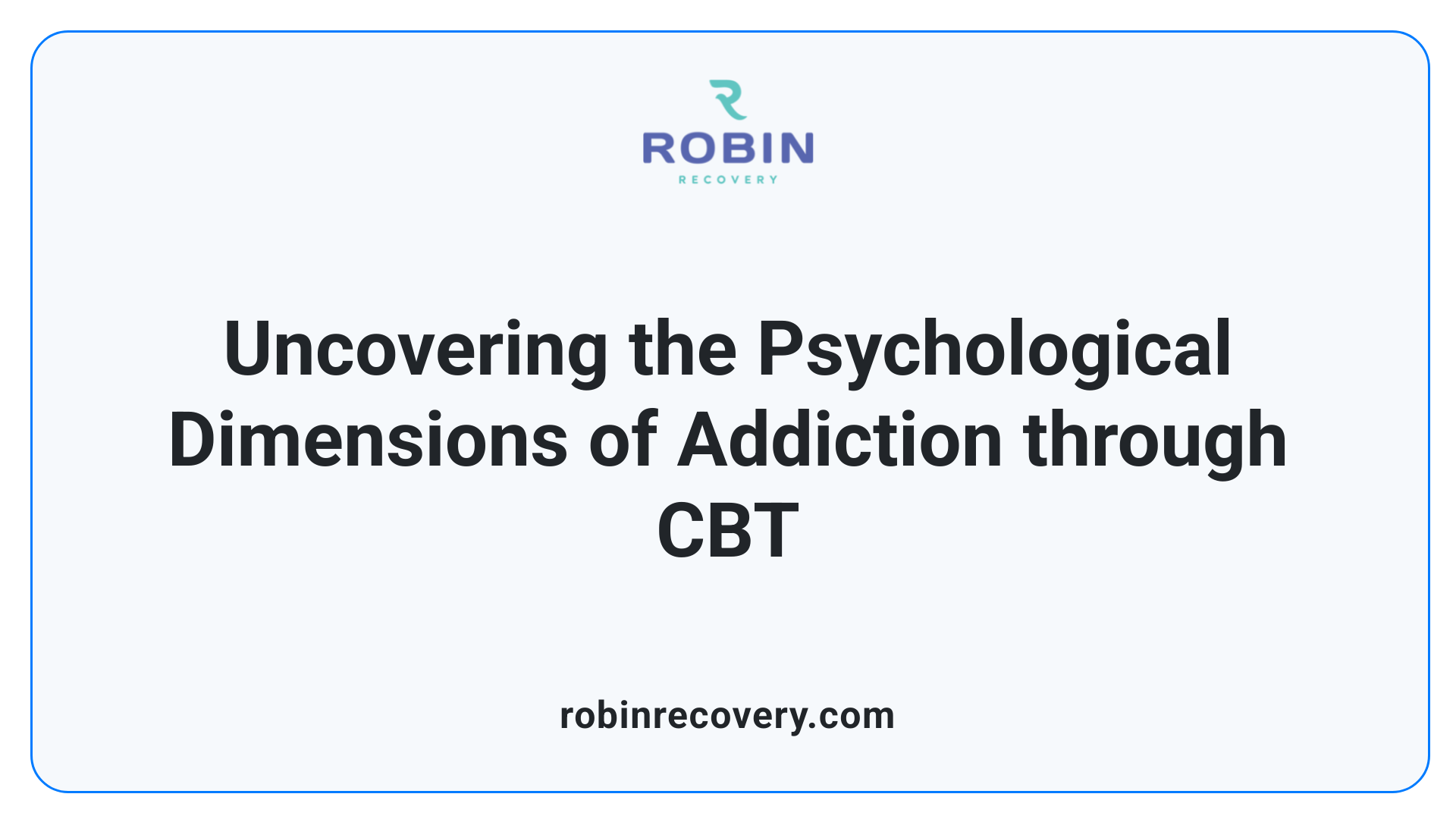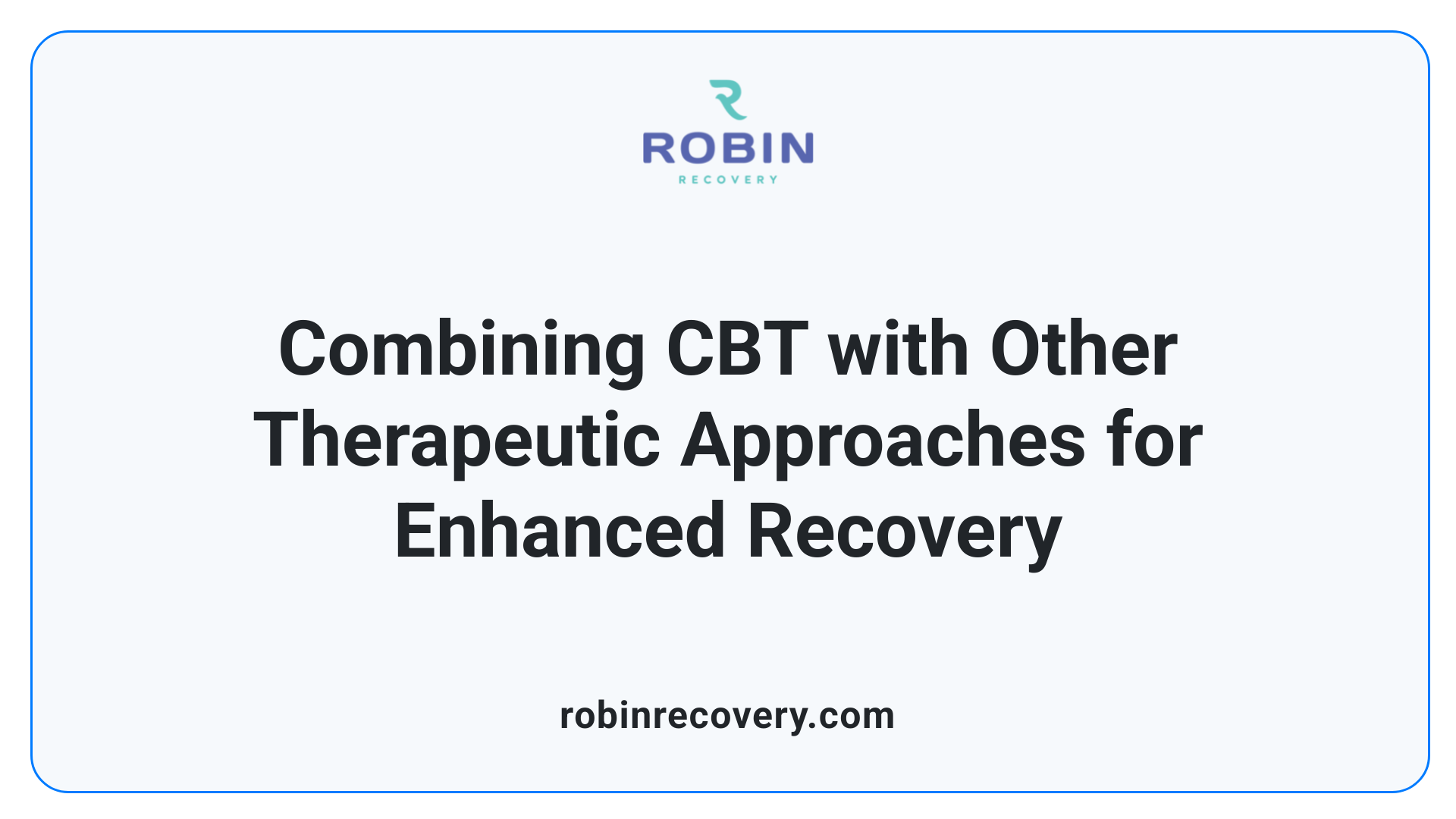How CBT Addresses Underlying Mental Health Issues in Addiction

Understanding CBT's Role in Addiction Treatment
Cognitive Behavioral Therapy (CBT) has emerged as a cornerstone in the treatment of addiction, recognized for its ability to target and transform the cognitive and behavioral components contributing to substance use disorders. By focusing on the underlying mental health issues often intertwined with addiction, CBT provides patients with a structured and evidence-based framework for recovery. This article delves into how CBT addresses these underlying issues, enhancing treatment outcomes and promoting sustainable recovery.
The Fundamentals of CBT in Addiction Treatment

Overview of how CBT works in addiction treatment
Cognitive Behavioral Therapy (CBT) is a structured, goal-oriented approach that targets the cognitive and behavioral aspects of addiction. It operates on the premise that thoughts, feelings, and actions are interconnected. By identifying and restructuring harmful thought patterns, CBT helps individuals understand the underlying issues contributing to their addiction.
The therapy is often short-term, typically lasting around 2 to 3 months, and is tailored to meet the unique needs of each individual. CBT not only focuses on immediate issues but also equips individuals with coping strategies to navigate cravings and emotional challenges that arise during recovery.
Identification of triggers and negative thought patterns
A critical component of CBT is recognizing and addressing triggers that may lead to substance use. Through various techniques, individuals learn to identify specific situations, feelings, and negative thoughts contributing to their cravings. CBT encourages individuals to reframe these thoughts, replacing them with healthier, more constructive beliefs.
For example, cognitive restructuring within CBT helps clients confront distorted thoughts that reinforce their addiction, such as believing they need substances to cope with stress. By challenging these beliefs, individuals create healthier narratives that promote sobriety.
CBT's role in reducing relapse rates
Research has shown that CBT can significantly reduce relapse rates in individuals undergoing treatment for substance use disorders. By enhancing self-awareness and providing practical coping strategies, CBT helps individuals manage triggers effectively, which is essential for maintaining long-term sobriety.
CBT integrates relapse prevention strategies that involve planning for high-risk situations and developing responses to cravings. Studies indicate that when CBT is combined with other therapeutic approaches, such as motivational interviewing, its effectiveness increases, further contributing to improved treatment outcomes. Through this comprehensive framework, CBT not only addresses the addiction itself but also the co-occurring mental health issues, making it a vital tool in recovery.
The CBT Model for Substance Abuse
What is the CBT model for substance abuse?
The Cognitive-Behavioral Therapy (CBT) model for substance abuse focuses on altering the cognitive and behavioral processes that contribute to substance use disorders (SUDs). This approach emphasizes increasing awareness of triggers and the consequences of substance use.
Through structured interventions, CBT equips individuals with essential coping skills to handle high-risk situations effectively. The model is generally delivered over a series of 6 to 14 sessions, ensuring that patients have the opportunity to engage with the material fully.
Key techniques such as relapse prevention and motivational interviewing
Among the central techniques integrated into CBT are relapse prevention and motivational interviewing.
- Relapse Prevention: Patients learn how to identify and plan for situations that may lead to a return to substance use, enhancing their ability to navigate cravings and stressors.
- Motivational Interviewing: This technique assists in addressing ambivalence about change, helping individuals find intrinsic motivation to alter their substance use behavior.
Additionally, contingency management is applied, where positive reinforcement is provided for maintaining abstinence, further promoting rehabilitation efforts.
Efficacy of CBT in treating substance use disorders
Research indicates that CBT is an effective treatment for SUDs, affirming its status as an evidence-based intervention. CBT produces moderate success in improving treatment outcomes, addressing both the addictive behaviors and the underlying mental health issues, such as depression and anxiety, which frequently accompany substance use. Overall, the CBT model not only aids in understanding and changing behaviors but also promotes awareness and management of one's substance use, leading to longer-lasting recovery outcomes.
Connecting Cognitive Mechanisms to Addiction
How does the cognitive approach relate to addiction?
Cognitive mechanisms play a pivotal role in addiction, shaping how individuals perceive their relationship with substances. Two primary cognitive processes are involved: automatic and controlled processes.
- Automatic Processes: These are reflexive responses that occur without conscious thought. In addiction, these might manifest as cravings or impulse urges to use substances, often leading to substance misuse without deliberate intention.
- Controlled Processes: These require conscious regulation and awareness. When someone is less aware of their triggers or coping strategies due to heightened automatic responses, it can lead to increased substance use.
The interaction between automatic and controlled processes is complex. Factors like stress, environmental cues, and underlying mental health issues can amplify automatic cravings while suppressing controlled responses, indicating a need for targeted therapeutic interventions.
How does CBT address these cognitive processes?
Cognitive Behavioral Therapy (CBT) targets both automatic and controlled cognitive processes contributing to addiction. By helping individuals develop awareness of maladaptive thoughts and beliefs, CBT fosters greater self-efficacy.
- Cognitive Restructuring: This technique helps clients identify negative thought patterns that lead to substance use and replace them with healthier views, reducing impulsive behaviors.
- Skills Training: Effective coping strategies are taught to manage cravings, enhancing controlled responses to triggers.
Through these methods, CBT works to weaken the automatic processes that lead to addiction while bolstering the controlled mechanisms necessary for healthier decision-making, offering a comprehensive approach to overcoming dependence.
Addressing Underlying Psychological Issues with CBT

Does CBT address underlying issues in addiction?
Cognitive Behavioral Therapy (CBT) directly addresses the underlying issues in addiction by focusing on identifying and challenging negative automatic thoughts and core beliefs that can drive maladaptive behaviors. These beliefs often stem from early life experiences and significantly influence an individual's thought patterns and coping strategies.
By helping clients recognize and detach from damaging beliefs that do not reflect their true self, CBT enables them to reframe their thinking. This shift not only reduces dependency on substances but also opens pathways to healthier cognitive routines. Furthermore, CBT distinctly emphasizes present thoughts and emotional triggers rather than solely fixating on past experiences, enhancing its effectiveness in tackling various psychological barriers linked to addiction.
How does CBT improve the quality of life for those with addiction?
CBT enhances quality of life for individuals struggling with addiction by equipping them with practical coping strategies and skills to manage cravings and triggers effectively. Techniques such as cognitive restructuring play a pivotal role in helping clients identify negative thoughts that support substance use.
Through structured discussions, clients learn to confront harmful beliefs and promote positive ones. This empowerment facilitates healthier responses to stress and emotional distress, ultimately leading to greater resilience in recovery. Additionally, by addressing concomitant mental health issues like anxiety and depression, CBT provides a more comprehensive approach to treatment, fostering improved emotional regulation and personal growth.
Aspect Focus of CBT in Addiction Outcome Negative Thought Patterns Identifying & challenging harmful beliefs Enhanced coping mechanisms Core Beliefs Restructuring damaging self-perceptions Reduced substance dependency Present Focus Concentrating on current thoughts rather than past experiences Improved coping skills in real time Emotional & Psychological Issues Addressing anxiety, trauma, and depression Better emotional regulation
In summary, CBT serves not just as a mechanism for overcoming addiction but as a means to enhance the overall psychological well-being of individuals through empowerment and self-awareness.
CBT's Techniques in Tackling Addiction

Techniques used in CBT for addiction
Cognitive Behavioral Therapy (CBT) employs a range of techniques specifically designed to address addiction. Some common methods include:
- Cognitive Restructuring: This technique helps individuals identify and challenge negative thought patterns contributing to substance use. By replacing these distorted thoughts with more positive and realistic beliefs, clients can develop healthier perspectives on their addiction.
- Motivational Interviewing (MI): MI is used to enhance motivation and commitment to change. This intervention directly addresses ambivalence towards quitting and encourages individuals to explore their desires for sobriety.
- Relapse Prevention Strategies: These strategies focus on equipping individuals with coping skills to manage cravings and avoid high-risk situations that may trigger substance use.
- Behavioral Experiments: Patients assess the validity of their negative beliefs about addiction through real-world testing, which can shift their perception and enhance self-efficacy.
Application of cognitive restructuring and role-playing
Cognitive restructuring is a crucial component in CBT, where individuals are taught to confront and reformulate negative beliefs about themselves and their addiction. This process helps them recognize how these thoughts influence their feelings and actions, fostering healthier choices.
Role-playing further supports this by allowing individuals to practice responses to triggers or high-risk scenarios in a safe environment. This experiential learning solidifies coping strategies, empowering individuals to navigate real-life challenges in their recovery journey.
CBT’s integrated use of these techniques underscores its effectiveness in breaking the cycle of addiction by addressing both behavioral and cognitive factors.
Integration of CBT with Other Therapies in Addiction Recovery

Combination of CBT with Other Therapeutic Approaches
Cognitive Behavioral Therapy (CBT) has proven effective for treating substance use disorders, particularly when integrated with other therapeutic modalities. When combined with motivational interviewing or contingency management, studies show an increased treatment effect size, enhancing the overall efficacy of the intervention.
This synergy allows CBT to address both cognitive and behavioral elements of addiction, while supplementary therapies support motivation and reward mechanisms essential for sustained recovery.
CBT's Role in Comprehensive Treatment Plans
In comprehensive treatment plans, CBT plays a crucial role by focusing on the cognitive and emotional barriers that inhibit recovery. It equips individuals with skills to tackle cravings, manage stress, and navigate situations that may trigger substance use.
Moreover, CBT accommodates co-occurring mental health disorders, making it adaptable to various individual needs. Its structured approach aligns well with pharmacotherapy and psychosocial interventions, promoting a holistic recovery journey. By working on thought patterns and behavioral responses in conjunction with other treatments, CBT helps establish a more robust foundation for long-term recovery from addiction.
Evaluating the Effectiveness of CBT in Addiction Treatment

What Do Research Findings Reveal About CBT's Effectiveness?
Cognitive Behavioral Therapy (CBT) has established itself as a robust treatment option for substance use disorders. Numerous studies have shown that CBT can lead to significant improvements in recovery outcomes. Meta-analyses have reported moderate to large effect sizes, with a modest treatment effect size of 0.15 across multiple studies.
Furthermore, when integrated with other psychosocial strategies like Motivational Interviewing, the effectiveness increases, showing an effect size of 0.31. Specific interventions, such as contingency management and relapse prevention, further bolster the impact of CBT by addressing cognitive and behavioral patterns that contribute to addiction. This structured, goal-oriented therapy equips patients with tools to manage cravings and navigate challenges effectively.
How Does CBT Compare with Other Treatment Modalities?
CBT stands out among various treatment approaches due to its evidence-based nature and adaptability. Unlike some modalities that may focus primarily on detoxification or medication, CBT addresses the cognitive and emotional aspects of addiction. Research indicates that while pharmacotherapy remains beneficial, CBT's efficacy often enhances especially when combined with medication and other supportive treatments.
Additionally, CBT is adaptable to technology-based interventions, thereby improving access to care for individuals who may face barriers in traditional therapy settings. Its comprehensive approach not only focuses on recovery from addiction but also simultaneously addresses co-occurring mental health issues such as anxiety and depression, making it a versatile choice in treatment plans.
AspectCBTOther Treatment Modalities Focus Cognitive and emotional issues Dependence on medication/ detox Effectiveness Moderate to large effect sizes Varies widely, less empirical data Integration Strong with psychosocial supports Often standalone Flexibility Technology-based adaptation Limited adaptability Addressing co-occurring conditions Yes Typically not integrated
These factors underscore CBT's vital role in successful addiction treatment, highlighting its empirically supported efficacy and its crucial place in integrated care strategies.
Future Directions and Innovations in CBT for Addiction
Adaptation of CBT to Digital Platforms
As technology continues to evolve, Cognitive Behavioral Therapy (CBT) is increasingly being adapted to digital platforms. This transition enhances accessibility, allowing individuals who face barriers to in-person therapy to engage in treatment remotely. Online CBT programs often incorporate interactive tools and exercises that mimic traditional face-to-face sessions, maintaining the effectiveness of the therapeutic process while providing convenience.
Potential Developments in CBT Methodologies
Future developments in CBT methodologies could further refine its effectiveness for addiction treatment. Innovations may include integrating artificial intelligence to tailor treatment plans based on individual progress and responses. Moreover, enhancing psychoeducation components within CBT can better equip clients to understand their addictions and the rationale behind coping strategies.
Therapists may also explore hybrid models, combining traditional CBT with newer interventions like mindfulness strategies and psychopharmacotherapy. These combined approaches are designed to address the multifaceted nature of substance use disorders effectively, particularly as individualized treatment becomes a focal point in addiction recovery efforts.
CBT: Catalyzing Change in Addiction Treatment
Cognitive Behavioral Therapy remains a powerful tool in addiction treatment, offering a structured, evidence-based method to address the underlying mental health issues that often accompany substance use disorders. By focusing on cognitive and behavioral transformations, CBT not only aids individuals in overcoming immediate challenges but also equips them with skills for sustainable recovery. As research continues to advance and evolve, integrating technological innovations and combining therapeutic modalities will further enhance CBT’s applicability, ensuring it remains at the forefront of effective addiction treatment. The insights gained from CBT not only benefit individuals in recovery but also enrich our broader understanding of the psychological intricacies driving addiction.
References
- Cognitive Behavioral Therapy (CBT) for Addiction & Substance Abuse
- Cognitive-Behavioral Therapy for Substance Use Disorders - PMC
- Useful CBT Techniques for Recovery | Benefits of Mental Health
- Cognitive Behavioral Interventions for Alcohol and Drug Use Disorders
- Cognitive Behavioral Therapy for Addiction & Mental Disorders
- Cognitive-Behavioral Therapy (CBT) for Addiction
- How CBT Improves Addiction Treatment Outcomes
- Cognitive Behavioral Therapy (CBT) for Addiction Treatment
